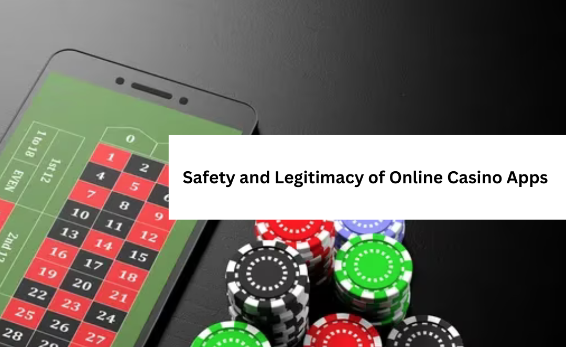In the digital age, online casino apps have become a go-to for casino players, allowing users to enjoy various mobile games from their devices. However, concerns about the safety and legitimacy of these apps have also emerged. This article delves into the degrees of protection provided by online casino apps, explores relevant technical details, discusses the certification process, and highlights notable instances where such applications have been compromised.
Degrees of Protection
To ensure a safe and secure environment, online casino apps employ various protective measures, including:
- Responsible Gambling Features: To promote responsible gambling, online casino apps often incorporate features such as deposit limits, self-exclusion options, and time management tools. These features aim to assist users in maintaining control over their gambling activities and prevent excessive or addictive behaviour.
- Privacy Policies and Data Handling: Online casino apps have strict user privacy policies. These include data collection, storage, security, and user rights. These policies comply with data protection laws, prioritizing user confidentiality and privacy.
- Regulatory Compliance: Legitimate online casino apps comply with regulations and licensing requirements, undergoing audits by regulatory bodies like MGA (Malta Gaming Authority). This ensures fair gaming, player protection, and legal obligations, adding an extra layer of user protection.
Technical Mechanisms Employed by Online Casino Apps
Online casino apps employ several technical mechanisms to ensure fair gameplay and protect against manipulation. These include:
- Random Number Generators (RNG): Trusted online casino apps use RNG algorithms to ensure the randomness and fairness of game outcomes. RNGs generate unpredictable and unbiased results, preventing any manipulation or unfair advantages.
- Two-Factor Authentication (2FA): Many online casino apps offer 2FA, an additional layer of security that requires users to provide a second form of authentication, usually through a unique code sent to their mobile devices. This significantly reduces the risk of unauthorized access to user accounts.
- Source Code Audits: Source Code Audits: Online casino apps undergo regular code audits by independent agencies like eCOGRA. These audits examine the app’s codebase to ensure fair gaming and industry compliance and identify vulnerabilities or loopholes.
- Secure Data Transmission: Casino apps use 128-bit and 256-bit SSL encryption for secure communication. This protects user data, ensuring confidentiality and preventing unauthorized access.
- User Account Protection: Online casino apps employ strong password policies, account monitoring, and anti-fraud systems like Risk Scoring, Behavioral Analysis, IP Geolocation, and Fingerprinting. These measures prevent unauthorized access and bolster user account security.
- Firewall and Intrusion Detection Systems: Most casino apps use Next Generation Firewalls (NGFW) and Web Application Firewalls (WAF) to protect servers. These systems monitor network traffic, block unauthorized access, and defend against malicious attacks, enhancing overall security.
- Secure Payment Gateways: The apps integrate trusted payment gateways like PayPal, Skrill, and Neteller, using encryption and fraud detection tech. This safeguards financial information and ensures secure deposit/withdrawal processes.
- Player Identity Verification: Online casino apps employ KYC procedures, biometric verification, verification codes/links, and database checks to confirm user identities. This prevents fraud, enhances player safety, and ensures compliance with regulatory requirements.
Certification Process
Online casino apps undergo certification processes from regulatory bodies, including eCOGRA, GLI, iTech Labs, UK Gambling Commission, and Malta Gambling Authority. These bodies audit source code for fairness, player protection, and compliance with safety standards.
Here is a step-by-step process for certifying online casino apps:
- Compliance Assessment: The app provider conducts an internal assessment to meet the relevant authorities regulatory requirements and industry standards.
- Documentation Preparation: The app provider gathers and prepares all necessary documentation, including business licenses, ownership details, financial records, security protocols, responsible gambling policies, and terms of service.
- Application Submission: This may involve completing an application form, submitting it to the regulatory body responsible for certification, and paying the necessary fees.
- Background Checks: The regulatory body performs background checks on the app provider, key personnel, and stakeholders to assess their integrity, financial stability, and suitability to operate an online casino.
- Technical Testing: This includes evaluating the random number generators (RNGs) for fairness and verifying the integrity of the gaming software.
- Security Audit: The app’s security measures, including firewalls, encryption protocols, and data protection mechanisms, are audited to ensure they meet industry standards and protect user information.
- Responsible Gambling Evaluation: The app’s responsible gambling features and policies are assessed to ensure they promote safe and responsible gambling practices. This includes self-exclusion options, deposit limits, and age verification processes.
- Financial Audit: The app’s financial systems and processes, including transaction handling, payment methods, and player fund segregation, are audited to ensure transparency and financial stability.
- On-Site Inspection (if required): In some cases, the regulatory body may conduct an on-site inspection of the app provider’s operations to verify compliance with regulations and assess physical security measures.
- Certification Issuance: If the app meets all requirements and successfully passes the assessments, the regulatory body issues the certification or license, indicating that the app has been deemed safe, fair, and compliant with industry standards.
Case Histories of Compromised Online Casino Apps and Sites
While the gambling industry prioritizes security, online casino app breaches might occur. Below are some notable cases surrounding online casino app and pokies sites breaches that have happened over time:
The NetBet Casino Data Breach
In 2020, NetBet Casino suffered a data breach that exposed the personal data of over 47 million users. A misconfiguration of an AWS server caused the breach, and the exposed data included names, addresses, email addresses, phone numbers, dates of birth, and login credentials. NetBet Casino confirmed the breach and offered affected users a free one-year subscription to Experian IdentityWorks. This data breach is a reminder of the importance of online security and the need for companies to protect their users’ data.
The Absolute Poker Scandal
In 2007, an insider at Absolute Poker manipulated the online poker app’s software to gain an unfair advantage, exposing vulnerabilities in the app’s security measures. This breach led to widespread mistrust among players and the online gambling community, highlighting concerns about cheating and fraudulent activities. The incident resulted in regulatory actions, loss of player trust, and efforts to compensate affected individuals.
Conclusion
From our research, ensuring the safety and legitimacy of online casino apps is paramount for both users and providers. By implementing advanced protective measures, employing advanced encryption techniques, adhering to fair gaming practices, and obtaining certifications from reputable regulatory bodies, online casino apps strive to provide secure gambling sessions. However, occasional breaches, such as that of NetBet in 2020, serve as a reminder that online casino applications or websites can be cracked.



